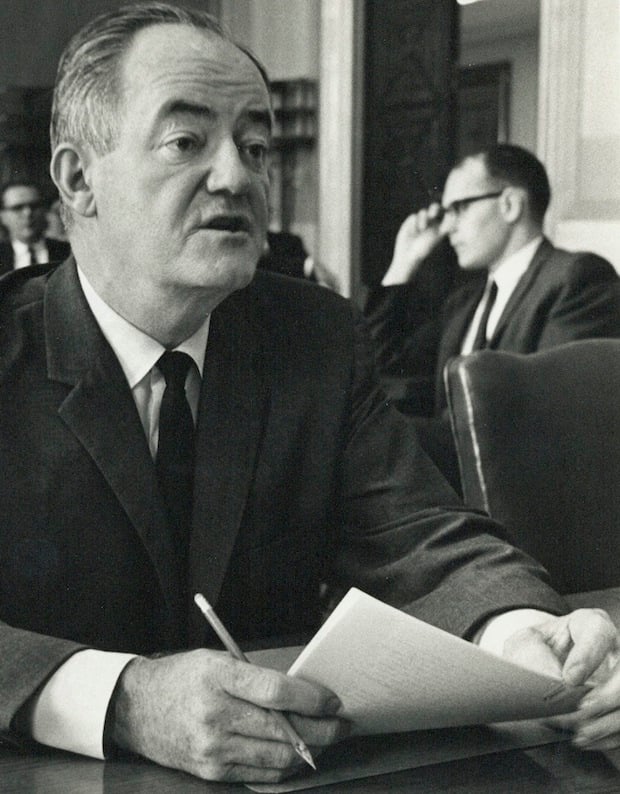Two excellent new books—by Todd Purdom and Clay Risen—have been written that seek to explain how the Civil Rights Act passed when most knowledgeable observers thought it would never survive a Southern Democratic filibuster in the Senate. The LBJ Library at the University of Texas held a “summit,” and the JFK Library in Boston held a forum. Its importance has been duly certified at many other events.
What is often missing, however, is a clear expression of why the act was so important. I’ll wager that most celebrants have only the vaguest notion of what the act accomplished and how it truly changed the fabric of American life.
A good way to test this hypothesis is to describe for a teenager or young adult what life was like for almost all African-Americans before the act passed. Those of us who are old enough to recall life before passage can talk about the inability of African-Americans to buy a Coke from Woolworth’s or take their families out for Sunday dinner at a good restaurant or make a trip that involved spending the night somewhere. The most fundamental things—using rest room facilities, eating, and sleeping were off limits.
Your kids or grandkids look at you as if you’re crazy. “No way,” I’ve been told. “Are you making that up?” Or, “That is just terrible. How can that be?”
How do you bring to life that the achievement of dignity and the stamping out of humiliation in everyday life was the act’s great accomplishment?
I worked for Senator Hubert Humphrey back in 1964. Say what you will about Humphrey, but he had an extraordinary capacity to identify and seize the essential truth of a situation. During the floor debate of the Civil Rights Act, he observed: “It is difficult for most of us to comprehend the monstrous humiliations and inconveniences that racial discrimination imposes on our Negro fellow citizens…What is happening is not so much economics, even though it amounts to economic deprivation. It is not so much education, even though we know people have been denied education. What is happening is humiliation, the lack of a sense of dignity which has been imposed upon people.”
It is the reality of humiliation and the absence of dignity that are so hard to explain today. But this also tells me that, despite all the work that remains to be done, the central objectives that drove the Civil Rights Act of 1964 were achieved.
Thanks primarily to the excesses of Birmingham’s Commissioner of Public Safety, Bull Connor, the nation finally grasped the heinous evil of racial discrimination and segregation. Maybe it took 200 years, but between 1963 and 1964, a significant majority of Americans got it.
Popular support for fixing these wrongs erupted to the degree that almost every conservative Midwest Republican—politicians who had built careers opposing the expansion of federal power—voted to give the US Department of Justice authority tell restaurant and motel owners that refusing service to African Americans and other minorities would no longer be tolerated. And these same senators went even further in supporting federal authority to combat discrimination in employment. Who could have imagined such behavior?
This determination to attack directly the humiliations faced daily by millions of African Americans led the Senate down the path of legislative miracles, at least by today’s standards. The usual scattershot liberals developed a grand strategy, stuck to it, and outsmarted Senator Richard Russell of Georgia, the crafty leader of the Southern Democrats. Bipartisan collaboration to pass the bill was robust and real. The debate was conducted in a fair and accommodating manner, even when it assisted the “enemy,” the Southern Democrats. The limelight was shared by Humphrey, Senate Majority Leader Mike Mansfield, and Senator Everett Dirksen, the Minority Leader, who delivered the final votes needed to end the filibuster.
And, at the end of the day, all these miracles were possible because a clear majority of Americans had come to believe that “monstrous humiliations” and denials of personal dignity could no longer be tolerated as elements of American society. The legislation passed; it was signed into law; and it changed America.
That is why we celebrate it fifty years later.
Two good books about the Civil Rights Act:
- Todd Purdum, An Idea Whose Time Has Come: Two Presidents, Two Parties, and the Battle for the Civil Rights Act of 1964, Henry Holt & Co., 2014
- Clay Risen,The Bill of the Century: The Epic Battle for the Civil Rights Act, Bloomsbury Press, 2014
John G. Stewart was legislative director for Senator Hubert Humphrey when Humphrey was the floor manager of the 1964 Civil Rights Act. He stayed with Humphrey from 1965 to 1969, when Humphrey was Vice President. He lived for 10 years on Capitol Hill and for 10 years in Chevy Chase DC. He now lives in Knoxville, Tennessee, with his wife, Nancy.










